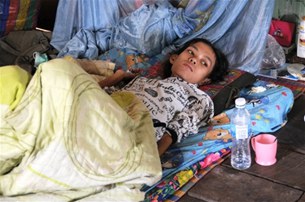
HIV/Aids in Myanmar at a glance
Myanmar (also called Burma) is far from ensuring universal access to treatment for HIV/Aids for all those who need it. Myanmar has the third highest HIV prevalence rate in Asia, after Cambodia and Thailand. In 2011, the HIV treatment: Antiretroviral Therapy (ART) was approximately 44% and the 12-month retention rate following HIV Treatment was 87%.
The Ministry of Health began surveying for HIV/AIDS in 1985. The first HIV case in Myanmar was reported in 1988, and the first AIDS patient was reported in 1991. The HIV epidemics in Myanmar are largely concentrated among key population with high risk, in particular female sex workers and their clients, men who have sex with men, people who inject drugs, and increasingly in the female sex workers partners of all these groups. The criminal nature of sex work in Myanmar, as it is prohibited by the 1949 Suppression of Prostitution Act, also contributes to the ineffectiveness of reaching out to sex workers with regard to HIV/AIDS awareness and condom usage.
The marked under-funding of the health system, and of public health in particular, by the various ruling military juntas which have controlled political life in the country since 1962 has further undermined efforts to understand and respond to the epidemic. The ruling junta has restricted the activities of international organizations, including the several United Nations (U.N.) agencies active in the country. Thanks to the ongoing political opening the collaboration between the government and different international stakeholders have slowly improved.
Nonetheless HIV prevalence in Myanmar has declined from 0.9% in 2000 to an estimated 0.6% in 2013 among general population aged 15 years and above.
One of the greatest challenges that needs to be overcome if Myanmar is to reach the targets set for 2016: the shortage of health personnel in the public sector and the major gaps in access and coverage. It will be crucial to scale up HIV treatment, which now covers only about 1 in 3 of those in need. Myanmar is committed to the goal of ending AIDS by 2030 and has confirmed to increasing domestic HIV funding by US$ 5 million.
(Photo: Sean Kimmons/IRIN)
Referenzen:
Myanmar confirms increasing domestic HIV funding by US$ 5 million
17 October 2014
Global AIDS Response Progress Report – Myanmar - National AIDS Programme
Myanmar, 31.03.2014
Combat HIV/Aids, malaria and other diseases - Where we are?
Myanmar has done well to stabilize the HIV/Aids epidemic and the prevalence among the general population (15-49 years old) is below 1 percent. The major challenge is to scale up HIV treatment.
Burma's homosexuality law 'undermining HIV and Aids fight'
Myanmar, 21 March 2014
A law criminalising "unnatural" sex is reinforcing the stigma that leaves gay men in Burma hidden, silenced and shamed, hindering efforts to contain HIV/Aids, claim experts and activists.
HIV, AIDS in Myanmar key focus for Aung San Suu Kyi, though there's still 'a long way to go'
In 2012, Ms Suu Kyi was named as UNAIDS Goodwill Ambassador.
Published: March 31, 2009
The most heart-breaking moment for doctors and nurses treating people with H.I.V./AIDS in Myanmar is the arrival of a new patient. Running short of funds and medications, clinics have started turning dying people away.
Traitement oral contre la cécité liée au VIH au Myanmar
Myanmar, 23.07.2014
Lors de la 20e Conférence internationale sur le Sida tenue à Melbourne, Médecins Sans Frontières (MSF) a annoncé que, pour la première fois au Myanmar, des patients ont commencé à recevoir un traitement oral pour la rétinite à cytomégalovirus (CMV), une affection opportuniste souvent négligée liée au VIH/sida et qui entraine une cécité permanente.
MYANMAR: Closing the HIV/AIDS “treatment gap”
YANGON, 12 October 2012
Health workers in Myanmar are confident that efforts to narrow the country’s huge gap between access to, and need for, life-saving medicines to treat HIV/AIDS are back on track after the Global Fund to Fight AIDS, Tuberculosis and Malaria invited the country to apply for additional funding.
